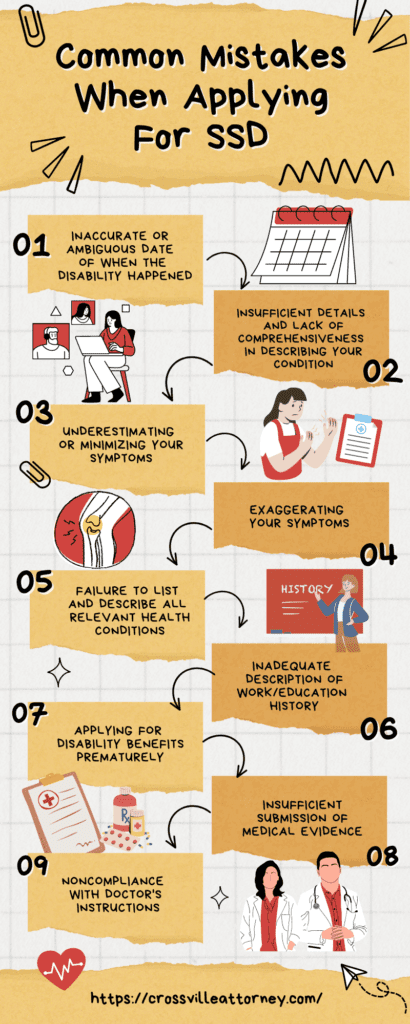Most Common Mistakes When Applying For SSD

Table of Contents
Social Security Disability benefits serve as crucial support for people facing disabling illnesses or injuries. Navigating the process of applying for these benefits can be overwhelming and complex. Despite the existence of SSD insurance to help those unable to work due to their disabilities, many applicants make common mistakes when applying for SSD that can jeopardize their eligibility.
While denials of claims can occur for various reasons, a significant portion of denials stems from errors made by applicants. Strict medical and technical criteria must be met to qualify for benefits, resulting in a high initial denial rate. Data from the Social Security Administration between 2001 and 2010 revealed that denied disability claims averaged over 50 percent.
To successfully navigate the application process and avoid common mistakes, it is advisable to seek guidance from a knowledgeable SSD attorney. Even if an error led to denying your initial claim, all hope isn’t lost. Many people who initially had their claims denied receive the benefits through the appeals process.
Burnett Law team specializes in handling Social Security Disability benefits claims and possesses extensive experience in this field for all East Tennessee. If you or a loved one has experienced a disabling condition that prevents you from working, our legal team is here to assist you in avoiding mistakes that could result in claim denials.
Whether you require assistance with an initial claim or an appeal, our streamlined processes enhance the likelihood of your claim being approved. When you choose us as your legal representation, you can have confidence in our commitment to providing exceptional service with a compassionate approach.
Contact Burnett Law today at 931-484-7549 to schedule a free consultation and take the first step toward securing the benefits you deserve.

Common Mistakes When Applying For SSD (Social Security Disability)
While the majority of questions on SSD claim forms may appear simple, there are specific pitfalls that often trip up applicants. Unfortunately, these pitfalls can lead to denial.
To be eligible for SSD, certain criteria must be met. Firstly, you must have a medical condition that has persisted or is expected to persist for at least 12 months or will result in death.
Additionally, you need to have earned an adequate number of work credits. This entails accumulating at least 20 credits, with at least half earned within the last 10 years. It’s worth noting that younger workers may qualify with fewer credits.
A significant reason for claim denials is the failure to possess the necessary work credits.
Understanding these common mistakes and how to avoid them can make a substantial difference between accepting and rejecting your SSD application.
Below, we highlight some of the most frequently encountered mistakes made on disability forms.
Inaccurate Or Ambiguous Date Of When The Disability Happened
Question number 9 on Form SSA-16-BK requires you to specify the onset date of your disability. This date signifies when your condition(s) became severe enough to impede your ability to work, even if you have never worked. Providing the correct response to this question is crucial as it determines the amount of back pay you may be eligible to receive for lost wages. However, many applicants find this question confusing, leading to costly mistakes.
When answering this question, it is vital to carefully consider and provide an honest and verifiable date for the Social Security Administration (SSA). If you had to quit your job due to disability, it is advisable to use the date following your last day of work. Choosing an earlier date, when you could still perform the work you claim you cannot do, can raise suspicion among SSA reviewers and undermine the credibility of your application.
Insufficient Details And Lack Of Comprehensiveness In Describing Your Condition
One primary error on SSD forms we see a lot in Crossville and Cookeville, is merely naming a medical condition without providing a thorough description. To qualify for disability benefits, you must demonstrate that your condition prevents you from engaging in substantial gainful activity. It is crucial to be specific and comprehensive when describing your condition and how it hampers your ability to work.
Simply stating “rheumatoid arthritis” is insufficient. Instead, provide a detailed account: “I suffer from severe rheumatoid arthritis affecting my knees, ankles, and wrists. Even short distances require me to use a walker, and I cannot perform the lifting tasks required in my previous job.”
If the space provided on the application is insufficient for your detailed description, utilize the “Remarks” section on the final page of the form to include any additional comments.
Underestimating Or Minimizing Your Symptoms
Some applicants may provide ample details on the form but unintentionally present an inaccurate account by underestimating or downplaying their symptoms. This tendency can stem from concerns about appearing overly complainant or weak when discussing symptoms. Additionally, individuals may not fully recognize the extent or severity of their symptoms.
It is essential to remember that providing a comprehensive and honest description of your symptoms does not diminish your strength or character. On the contrary, your honesty and thoroughness are crucial for reviewers to understand your situation completely.
When describing the symptoms related to your condition, carefully consider how it manifests itself. Be truthful with yourself and transparent with the SSA.
Exaggerating Your Symptoms
Conversely, some applicants may fall into the trap of exaggerating their symptoms, believing that more severe-sounding symptoms will increase their chances of receiving SSD benefits.
However, exaggeration is a misguided strategy that can harm your credibility and lead to the swift denial of your application. It is important to note that SSA officers will review your medical records to verify the statements in your claim. If your reported symptoms exceed what is documented in those records, your application may be considered invalid.
Failure To List And Describe All Relevant Health Conditions
When prompted to list the conditions affecting your ability to work, it is essential to avoid solely focusing on your primary health issue. While providing a thorough description of that condition and its impact on your life is crucial, it is equally important to acknowledge any other significant conditions.
Include and describe these conditions, regardless of how minor they may seem. Reviewers understand that a combination of minor ailments can accumulate, making it impossible to work. They need a comprehensive understanding of all your conditions to assess your situation fairly.
This also applies to diagnosed mental health conditions such as depression, anxiety, or others that significantly affect your ability to work. Some applicants underestimate the impact of their mental health conditions on their SSD claims, which is a mistake. Mental well-being is crucial in workability, so include any diagnosed mental conditions on your application.
Inadequate Description Of Work/Education History
While applicants may provide a thorough description of their medical condition, they sometimes fail to demonstrate how it renders them unable to work. This can occur when people do not adequately detail the requirements of their most recent job or any previous work experience.
For example, if the SSA discovers that you have extensive experience in a field where reentry seems possible, it may raise doubts about the credibility of your application. It is advisable to proactively address all your previous training and work history to explain why you cannot work.
Applying for Disability Benefits Prematurely
Eligibility for disability benefits requires a medical impairment that persists or is expected to persist for at least 12 months. Applying too soon can hinder the ability to prove a permanent disability. If an SSA examiner determines your condition will improve, you may be deemed ineligible for benefits. It is essential to apply only when the medical evidence establishes a year or more for your disability.
Insufficient Submission of Medical Evidence
Your SSDI application must include comprehensive medical evidence, such as examination history, diagnosis, prognosis, surgical records, prescribed medications, and details of rehabilitation or therapy. Failure to provide sufficient medical information or lack of supporting records can lead the SSA to order additional consultative exams. Relying solely on a consultative exam is a mistake, as its findings may not offer adequate proof of your disabling condition and could result in a denial of your claim.
Noncompliance with Doctor’s Instructions
When assessing disability benefits, the Social Security examiner considers your treatment history and your response to treatment. Following your doctor’s instructions diligently, including medication adherence and participation in recommended rehabilitation programs. Neglecting the prescribed treatment regimen greatly increases the likelihood of your disability application being denied.
If your initial claim is denied, contacting an SSD attorney during appeals significantly improves your chances of receiving benefits. Despite concerns about affordability, Burnett Law SSD attorneys operate on a contingency basis. This means that our fees are only a percentage of the back disability pay you receive.
Why Choose Burnett Law SSD Attorneys
Navigating the application process for disability benefits can be complex, and the reality is that many initial claims are denied. However, you can significantly enhance your likelihood of a favorable outcome by enlisting the support of our experienced disability attorneys. Our dedicated legal team will guide you through the entire application process, ensuring it is error-free and optimized for success.
We understand the importance of comprehensive medical evidence in strengthening your claim. That’s why we will collaborate closely with your doctor to gather and present the necessary documentation to support your case. With our extensive knowledge of the eligibility criteria for disability benefits and our wealth of experience handling claims within the Social Security Administration, we are well-equipped to advocate for your rights.
If you are facing challenges with your disability benefits application or feel overwhelmed by the process, don’t hesitate to contact the Burnett Law firm today. With over 25 years of experience, we have helped numerous disabled individuals secure the benefits they deserve.
Contact Burnett Law today at 931-484-7549 to schedule a free consultation.
Disclaimer: The information contained in this blog or on this website is provided for informational purposes only, and should not be construed as legal advice on any specific subject matter. No person should act or refrain from acting due to any content included in the site without seeking legal or other professional advice on the particular facts and circumstances at issue from an attorney licensed in the person’s state. The Firm expressly disclaims all liability in respect to actions taken or not taken based on any or all the contents of this blog or website.
Burnett Law
Search Posts
Recent Posts
- Car Accidents: Types of Damages October 22, 2024
- Car Accidents: Demystifying Legal Jargon August 9, 2024
- How to Choose the Right Personal Injury Attorney After a Motorcycle Crash January 16, 2024
- Navigating Insurance Claims After a Car Accident: A Step-by-Step Guide January 9, 2024
- Understanding Social Security Disability Hearings in Tennessee January 5, 2024
Categories
Subscribe!
Thanks for subscribing! Please check your email for further instructions.
